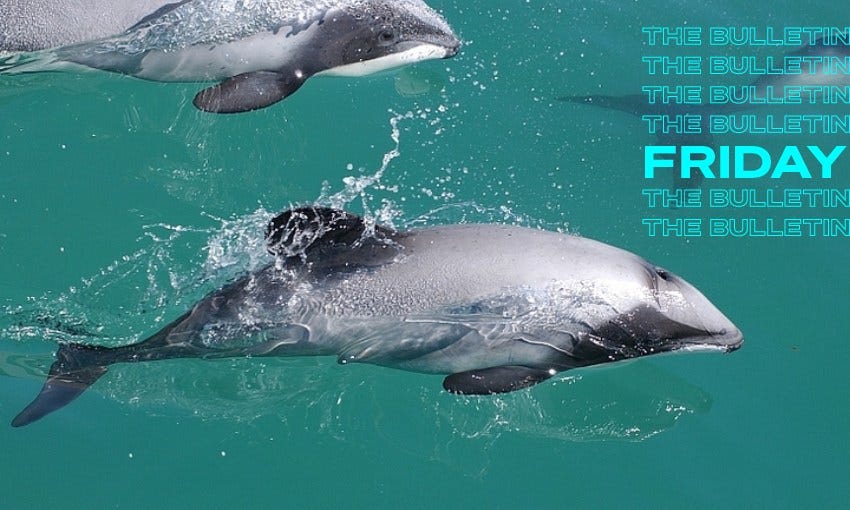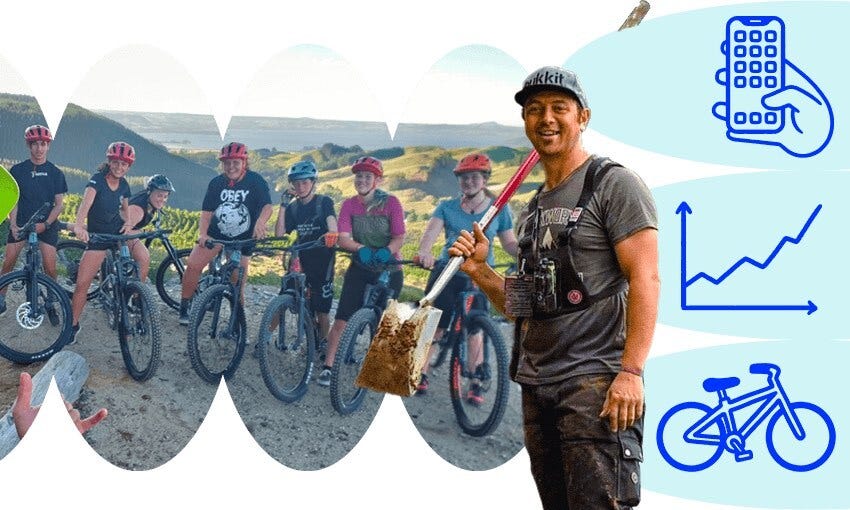Beneath the surface of budget headlines
The budget can feel like a short-lived newsapalooza but follow-ups from journalists this week got into the stories and impact behind the numbers.
Mōrena and welcome to The Bulletin for Friday, May 27, by Anna Rawhiti-Connell. Presented in partnership with Z Energy.
In today’s edition: PM delivers Harvard address; family violence guidelines released; money for Bromley residents but first, a dive into budget follow-ups.
Journalists get under the surface of budget stories including one on efforts to save the Māui dolphin (Photo: RNZ/Earthrace Conservation/Liz Slooten)
Beyond the budget week headlines
The budget is reported in a flurry of press releases and numbers. It’s too easy in a daily news environment to file your last bumper budget edition and say “it’s done”. I am specifically talking about me after last week. We had the first follow-up to a large pre-budget announcement yesterday with details of a $6m plan to help retailers protect against ram raids. I thought it would be worth looking at some great follow-ups from this week that go beyond the initial announcements and the “we love it/we hate it” reactions.
Cats: the elephant in the room
Newsroom's David William’s has written this superb example of taking a comparatively small allocation and digging into the story behind it. Budget 2022 allocated $7.1m towards a programme to save the endangered Māui dolphin. As Williams writes, “the programme was deemed so important a picture of Māui dolphins adorned the ministerial press release”. Williams starts by asking why, for a species on the brink of extinction, funding for the work doesn’t start until mid next year. It goes from there and is a truly great deep dive into scientific spats, the seafood industry, cats and government departments being concerned about sounding like Gareth Morgan.
Justice funding revives optimism after years of little progress
The NZ Herald’s Derek Cheng has picked up on the justice allocations in the budget looking at legal aid and support for victims of crime. This goes beyond last week's budget and back to the sense of optimism about change in the justice sector after a series of government-run summits in 2017. Little progress has been made since then. Budget 2022 allocated $45.7m towards a victims operating model. It has renewed optimism among those who’ve been calling for change since 2015. On legal aid, inadequate pay for legal aid work has been one of the biggest deterrents for lawyers. From July, the rate will be lifted by 12% but Law Society president Jacque Lethbridge has said more needs to be done to ensure people have access to legal aid.
Mediawatch goes hunting for a long-promised strategy
RNZ’s MediaWatch picked up on the $40 million for Māori media in the budget. It follows a similar increase the year before. Mediawatch isn’t critical of the funding but has asked where a long-awaited Māori media strategy review is. The Māori Media Sector Shift review was launched in 2018 by Nanaia Mahuta. In 2020, a document was released that proposed a “one-stop shop” for Māori media. It was not beloved by the sector. Willie Jackson took over the portfolio and appointed a new Māori Broadcasting Advisory Panel to rethink things. Hayden Donnell spoke to Ella Henry, who stepped down as chair of the advisory panel last year, about where the review might be at.
Connecting a business in the middle of a forest
Rotorua is a world class destination for mountain bikers. But setting up a biking business in the middle of the forest was more difficult than Tuhua Mutu thought. Nestled in the iconic redwoods of Whakarewarewa Forest is Mountain Bike Rotorua, where staying connected to communicate with visitors and keep everyone safe is essential. Mutu shared his story of building a thriving business, overcoming the challenges of being remote with The Spinoff here. Vital to that business is a good, stable internet and phone connection – ensuring visitors stay safe in every corner of the park. Learn more about how Vodafone can help you to embrace the magic of technology. (Sponsored)
“I am a politician from Morrinsville”
Prime minister Jacinda Ardern delivered the commencement speech at Harvard university’s graduation ceremony this morning. You can read the account from the university's daily paper, the Harvard Crimson here and watch the address here. She paid tribute to Benazir Bhutto who was the first woman to have given birth in office. Bhutto delivered the commencement speech at Harvard in 1989 where she said “We must realise that democracy… can be fragile.” Ardern picked up on that theme and railed against misinformation and urged that we “reclaim the space in between'' our differences. She also touched on gun reform. Ardern received an honorary Doctor of Laws degree alongside six others who received honorary degress including feminist, political activist, and editor Gloria Steinem.
Family violence guidelines released
The government has released guidelines that set out best practice for dealing with family violence. One set is for use by specialist family and sexual violence organisations and another, for general workforces. It’s part of the wider 25-year strategy to eliminate family violence. Women's Refuge chief executive Dr Ang Jury said the guides provided a shared understanding on what family violence looks like and that “there is going to be no excuse now for people who say, 'Well, I didn't know what was an appropriate response'. When [the minister says] people can use it, I would say I would go further than that and say they should use it."
The Spinoff wouldn’t exist today without the generous support of our members.
If you want to support what we do, please consider joining up. There is no minimum to donate and you’ll not only help make local journalism happen but gain a bunch of great member-only perks, including a world version of The Bulletin, written by Peter Bale, delivered direct to your inbox every Thursday, less advertising, an RSS feed, cool merch and more. Join today!
Bromley stench
For residents dealing with what the media have dubbed the “Bromley” stench, there has been some assistance offered by the Christchurch City Council. Yesterday it voted to provide more than $1m worth of funding to affected residents. Each household will receive $200 from Monday, as well as discretionary medical funds. A health register will also be created to monitor illnesses or symptoms caused by the smell. I’ve listened to a few stories about this one where residents have been in tears about the impact this was having on them. The Detail covered it well this week. I hope this funding provides some help but imagine the focus is on counting down the days, weeks and months until the remedial work to fix the problem is done.
Got some feedback about The Bulletin, or anything in the news? Get in touch with me at thebulletin@thespinoff.co.nz
Which public entities can we trust to manage our information? Maybe not as many as we should. Samson Samasoni finds many are badly failing to meet their legal obligations. Toby Manhire watches as mourning, angry Americans look to Jacinda Ardern on gun law reform on the prime minister's US tour. Charlotte Muru-Lanning profiles stereotype-smashing woodchopping legend Sheree Taylor. Sam Brooks reviews Kid Sister, an ambitious new local comedy on TVNZ OnDemand. And we did it: ranked all Shortland Street's first 30 years from worst to best.
New Zealand doubles players off to good start at French Open
Michael Venus and Erin Routliffe are each through to the second round of the clay-court tournament. Routliffe is playing at Roland Garros for the first time with partner Alicja Rosolska. Venus won the 2017 doubles title with Ryan Harrison and is now playing with Tim Puetz. They won their last match in 57 minutes and will play their second round against French pair Arthur Rinderknech and Benjamin Bonzi. I admire people who can play doubles tennis. I was a revolting doubles partner. I was either very angry at my partner for missing shots or yelling at them to take ones I couldn’t be bothered running for.
RIP the payphone
Payphones. Everywhere I've looked this week, there they’ve been. Online. Not in physical form. I wouldn't know where an actual payphone was if my life depended on it. Its demise is global. New York City just ripped its last one out. Here in New Zealand, Spark has revealed plans to phase out its phone booth calling and free Wi-Fi services. Yet in the UK, five million payphone calls are still made each year. Who is making them? Who are they calling? This audio long read (yes, weird to write) from The Guardian takes a look.













The pay phone story reminded me of this pay phone project: https://www.nytimes.com/1998/05/14/technology/if-a-pay-phone-rings-who-will-answer.html
Times have changed I guess…